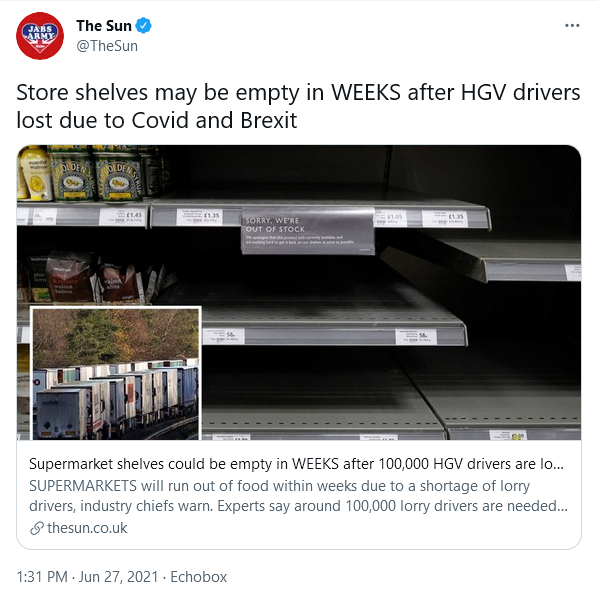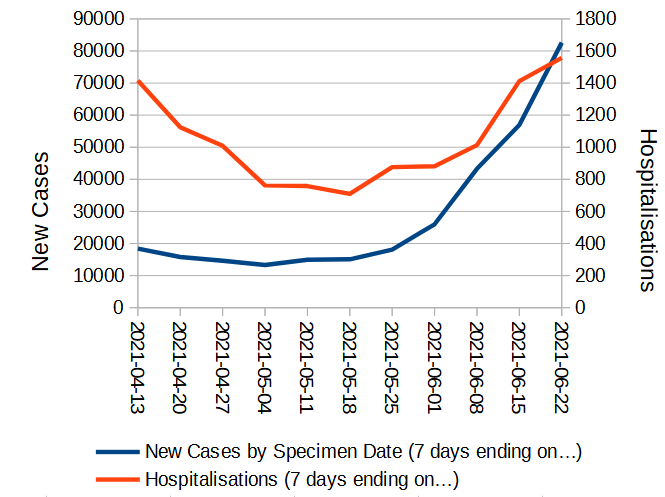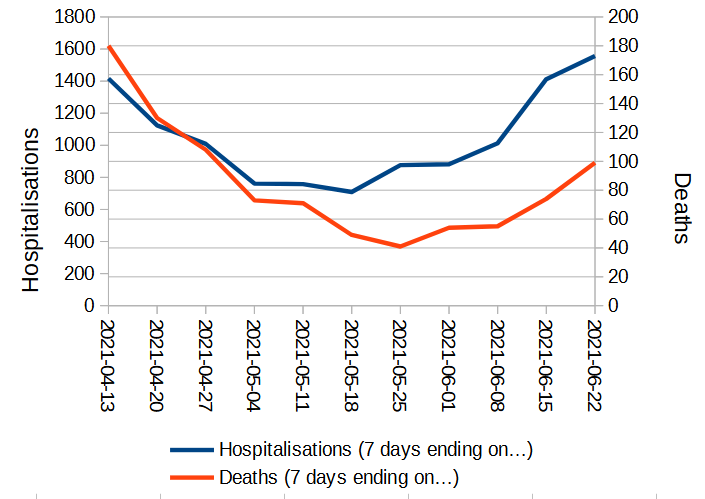
Woke up with a wild idea running through my head: why don't we rejoin the EU?!
Could be nuts, could be a lightbulb moment. Might at least be worth considering.
After all, as EU members, we could expect to enjoy...
1. Unfettered access to the largest trading bloc in the world.
Could be nuts, could be a lightbulb moment. Might at least be worth considering.
After all, as EU members, we could expect to enjoy...
1. Unfettered access to the largest trading bloc in the world.
2. No customs formalities, border checks or red tape.
No more food confiscated. No more lorry parks & queues of trucks.
Just free-flowing borders instead, supporting the just-in-time manufacturing that underpins millions of jobs in our automotive, aerospace and other sectors.
No more food confiscated. No more lorry parks & queues of trucks.
Just free-flowing borders instead, supporting the just-in-time manufacturing that underpins millions of jobs in our automotive, aerospace and other sectors.
3. Free trade deals with over 80 countries around the world, plus the opportunity to shape future deals to our benefit by combining our negotiating experience with the rest of the EU's. (Our draft trade deal with Australia might help accelerate the EU's own efforts.)
4. NI would no longer be treated differently to the rest of the UK. No hard border on the island of Ireland, or the Irish sea. Support for the Good Friday Agreement & active promotion of the Irish peace process, including PEACE funding (over EUR 1.5 billion between 1995 and 2020)
5. The automatic right for UK citizens to travel, work, study and retire anywhere in the EU without needing to secure visas. The end of upheaval for those settled abroad and uncertain about their futures. (The same freedoms would extend to EU citizens coming here too, of course.)
6. Simpler, smoother scientific and academic collaboration, with UK and EU teams drawing on the brightest and best from all across Europe.
Horizon participation (funding and assistance for over 10,000 research projects in the UK as part of the world's largest such programme.)
Horizon participation (funding and assistance for over 10,000 research projects in the UK as part of the world's largest such programme.)
7. Pet passports valid for 3 years and multiple trips, rather than the current Animal Health Certificates that have to be obtained in advance of every trip, and which only last for a few months.
8. Simplified fixed compensation scheme for flight delays and cancellations, thanks to EU Air Passenger Rights.
9. A health insurance card valid all over the EU and the EFTA countries too (GHIC doesn't cover the latter destinations).
9. A health insurance card valid all over the EU and the EFTA countries too (GHIC doesn't cover the latter destinations).
10. Car insurance valid across the EU, without the need to show an insurance green card when travelling. Driving licences valid EU-wide too.
11. Mobile roaming (calls, texts and data) at home rates, protected by an EU directive. This would eliminate EE's planned daily surcharge of £2, for example.
12. Access to the same streaming subscription content (Netflix, Spotify etc.) all across the EU as well as at home.
12. Access to the same streaming subscription content (Netflix, Spotify etc.) all across the EU as well as at home.
13. Participation in Erasmus+, which offers opportunities to go abroad for higher education, vocational education, training, job shadowing experience, sports, youth programmes etc. (Hundreds of thousands of UK citizens benefitted from the predecessor Erasmus scheme in the past.)
14. Simpler treatment of VAT for sales to the rest of the EU market (because we'd be in the EU, we'd benefit from the changes coming in on 1 July 2021 and designed to make intra-EU distance sales easier and smoother.)
15. Guaranteed high minimum standards of food safety, underpinned by EU law.
We would be free to set our own standards higher than these minimums, of course. But we couldn't drop below, so for example there's no danger of chlorinated chicken via the back door of a trade deal.
We would be free to set our own standards higher than these minimums, of course. But we couldn't drop below, so for example there's no danger of chlorinated chicken via the back door of a trade deal.
16. Better consumer protection for cross-border shopping, including improved rights of product return.
17. No more need to complete customs documents when sending packages between the UK and the EU, something which even private individuals have to do at the moment.
17. No more need to complete customs documents when sending packages between the UK and the EU, something which even private individuals have to do at the moment.
18. Ready access to a large mobile workforce. We would have to make an effort to make the UK a welcoming destination again, but industries from hospitality to farming to food production to logistics and distribution would be able to begin addressing their severe staff shortages.
19. Enhanced environmental protections, including laws that mandate clean beaches and high standards of air pollution mitigation.
20. Emergency disaster relief funding, such as the 60 million euro the UK received for flood relief in 2017.
20. Emergency disaster relief funding, such as the 60 million euro the UK received for flood relief in 2017.
21. Free movement for musicians and their instruments, bands and their equipment, film and TV production crews etc. Music tours would become viable again.
(The entertainment industry is worth over £100 billion a year, i.e. more than 100x the size of the fishing sector.)
(The entertainment industry is worth over £100 billion a year, i.e. more than 100x the size of the fishing sector.)
22. The use of EU-designated queues at airports and ports, rather than the slow non-EU queues (we can use the automatic e-gates too). Near-zero immigration formalities, with no need to show a return ticket, proof of accommodation, or access to a certain minimum level of funds.
23. Participation in the EU REACH chemical regime so that firms which manufacture or use chemicals would only need to register them once across the EU (which would include the UK) rather than the current dual regime of REACH and UK REACH.
Significant cost savings, less red tape.
Significant cost savings, less red tape.
24. Participation in the CE mark product conformity scheme. This would allow products made in the UK to be marketed all over the EU, and EU products to be sold anywhere in the UK.
(From 1 January 2022, a UKCA mark will be mandatory for UK sales. It's not valid in the EU or NI.)
(From 1 January 2022, a UKCA mark will be mandatory for UK sales. It's not valid in the EU or NI.)
25. Training courses for the unemployed, funded from the European Social Fund.
26. Broader security cooperation, and sharing of all major crime/terrorism databases. Participation in the European Arrest Warrant scheme.
26. Broader security cooperation, and sharing of all major crime/terrorism databases. Participation in the European Arrest Warrant scheme.
27. Court of last resort (ECJ) that can take action against overreach by national governments.
28. Single trademark system across the EU, rather than the current fragmented system of dual UK/EU trademark registrations. (UK trademarks aren't valid in the EU, and vice-versa.)
28. Single trademark system across the EU, rather than the current fragmented system of dual UK/EU trademark registrations. (UK trademarks aren't valid in the EU, and vice-versa.)
29. Participation in Galileo GPS satellite cluster, including projects like new ground stations.
30. EU funding for British films, theatre and music.
31. Participation in European Capital of Culture programme (which has previously benefitted cities such as Glasgow & Liverpool).
30. EU funding for British films, theatre and music.
31. Participation in European Capital of Culture programme (which has previously benefitted cities such as Glasgow & Liverpool).
32. UK firms would be able to trade carbon credits via the EU's ETS (the world's largest emissions trading scheme) rather than being limited to the UK's much smaller domestic scheme.
Gives them greater flexibility when offsetting emissions, and puts them on a par with EU firms.
Gives them greater flexibility when offsetting emissions, and puts them on a par with EU firms.
33. Service providers such as freelance translators could offer their services to clients all over the EU without having to establish themselves elsewhere in the EU.
(Since the UK would be in the EU, that would fulfil the "EU presence" requirement.)
(Since the UK would be in the EU, that would fulfil the "EU presence" requirement.)
34. All UK citizens would be granted EU citizenship (it's a real thing, with real benefits - look it up)
35. Enhanced cross-border collaboration on tax issues, which would enable us to better hold huge multinational firms like Amazon and Facebook to account.
35. Enhanced cross-border collaboration on tax issues, which would enable us to better hold huge multinational firms like Amazon and Facebook to account.
36. We can retain our blue passports. (Burgundy is the recommended colour for the passports of EU member states, but it's not mandatory. Croatia has blue passports.)
37. No surcharges on credit and debit card transactions anywhere within the EU (prohibited by EU law).
37. No surcharges on credit and debit card transactions anywhere within the EU (prohibited by EU law).
38. European Regional Development Funding to support projects that boost investment and create jobs. (From 2007-2013, England received £2.6 billion in funding, supporting thousands of projects.)
39. European Structural Funding (Wales received over £4 billion between 2014-2020)
39. European Structural Funding (Wales received over £4 billion between 2014-2020)
40 Legal protection for minority languages, such as Welsh.
41. Extensive legal protection for foods of geographic origin, e.g. "Melton Mowbray pork pies", meaning the same geographically-qualified terms cannot be used anywhere else in the EU.
41. Extensive legal protection for foods of geographic origin, e.g. "Melton Mowbray pork pies", meaning the same geographically-qualified terms cannot be used anywhere else in the EU.
42. Products that are made or grown in the UK can be sold in 31 countries without any kind of red tape such as type approvals, import/export documentation, phytosanitary certificates etc., and without the imposition of customs duties.
43. The granting of financial services passporting and equivalence, which enable UK firms to sell investment products, insurance and financial services anywhere in the EU from their UK base, without having to first establish a physical presence elsewhere in the EU.
44. UK students could go to university in other EU countries at home student rates (some EU countries still offer free education).
EU students would be able to study in the UK by paying the same as UK students, helping our universities to attract more international students.
EU students would be able to study in the UK by paying the same as UK students, helping our universities to attract more international students.
45. UK fishermen would have the right to land their catch in the EU without a tonne of paperwork (they used to send more than half their catch to the EU before Brexit).
Shellfish operators would be able to export their products to the EU for purification, unlike now.
Shellfish operators would be able to export their products to the EU for purification, unlike now.
46. Stronger IP protection: sui generis database rights for databases created in the UK aren't protected in the EU, and vice versa. (Which is why firms such as OpenStreetMap are considering relocating to the EU.)
Inside the EU, they'd be protected across the whole EU territory.
Inside the EU, they'd be protected across the whole EU territory.
47. Complex "rules of origin" requirements would be eliminated. These dictate how much UK or EU content can go into a product, and how much processing it can undergo in the UK or the EU before tariffs apply to it.
This would cut costs, and give manufacturers more flexibility.
This would cut costs, and give manufacturers more flexibility.
(More to come soonish. This placeholder tweet will be deleted when the thread gets extended.)
On your way out, please check out my book 'Slaying Brexit Unicorns'.
It debunks two dozen Brexit myths, and is available from Amazon on Kindle and in paperback.
amazon.co.uk/Slaying-Brexit…
On your way out, please check out my book 'Slaying Brexit Unicorns'.
It debunks two dozen Brexit myths, and is available from Amazon on Kindle and in paperback.
amazon.co.uk/Slaying-Brexit…
• • •
Missing some Tweet in this thread? You can try to
force a refresh






